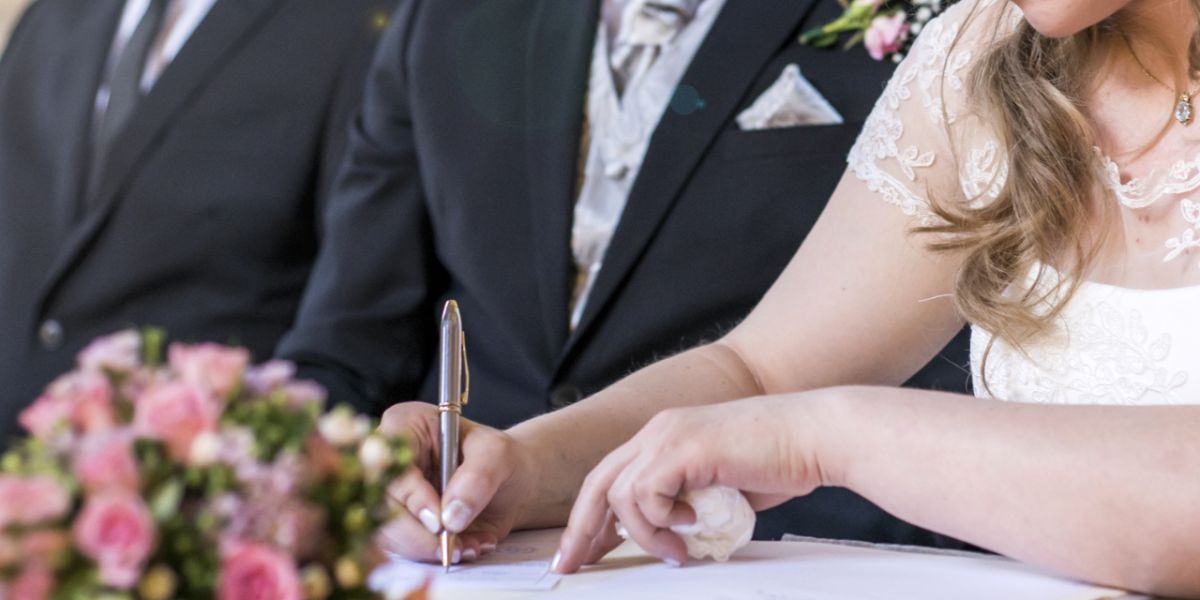
Marriage has wind in its sail in Luxembourg! Nearly 2,500 unions were celebrated in 2022, a steadily rising number among both Luxembourgers and the expat community. The Grand Duchy is a welcoming country, and its legal framework affords all couples the opportunity to officially unite. What documents are required? What steps need to be taken? How do you declare a marriage celebrated abroad? Here's everything you need to know.

Who can get married?
Anyone aged 18 or above can marry in Luxembourg, while minors need the permission of a guardianship judge.
Marriage is open to both opposite-sex and same-sex couples without distinction since 2015.
In addition to the minimum age, at least one of the spouses must officially reside in Luxembourg, regardless of the partners' nationality.
What are the steps to get married?
Only civil unions are legally recognized in Luxembourg, so that couples must appear before the bourgmestre (equivalent of the mayor) prior to any religious ceremony.
The marriage must be celebrated in the municipality of residence of one of the future spouses. First, you need to go to the local gemeng (equivalent of a municipal office) to collect the marriage application form.
Here is the list of required documents:
- A valid ID (identity card or passport)
- A recent birth certificate (less than 6 months old)
- A certificate of residence
- A certificate of marital capacity (usually provided by the consulate of your home country and must be in French, German, or English).
The completed application must be submitted in person, either with or without an appointment depending on the gemeng. Both future spouses are generally required to be present, although this can vary by municipality. At this time, the date and time of the civil ceremony will also be set.
What are the timelines?
Although gathering the necessary documents may take some time, Luxembourg's efficient administration means that timelines are usually quite short.
For Luxembourgish nationals, it is recommended to start the process at least two months before the wedding, while foreign residents should allow for a three-month period.
However, depending on the wedding date and location, the process can sometimes be faster (2 to 3 weeks), with the only non-negotiable time period being the 10-day publication of marriage banns. The marriage must be celebrated within 12 months of the banns' publication by the municipality upon receipt of the file.
Cost and organization of the civil ceremony
A fee is often required, either when submitting the application or within a few weeks of the ceremony. This fee typically ranges between €15 and €30, depending on the municipality.
Note that witnesses are not required for marriages in Luxembourg, meaning it is possible to get married without anyone else present besides the municipal staff. The civil ceremony lasts around 15 to 20 minutes, and some municipalities may provide a small reception afterward.
Additionally, every employee in Luxembourg is entitled to three days of special leave for their wedding, which must be taken at the time of the marriage.
The different matrimonial regimes
Couples can choose from several types of matrimonial regimes. If no prenuptial agreement is signed, the default regime is community property.
It is advisable to discuss your situation with a notary to choose the most suitable arrangement (community property, universal community of property, separation of property, etc.). Future spouses can sign the marriage contract of their choice as long as it complies with the law.
It is possible to change the matrimonial regime at any time after the civil union.
The religious ceremony
After the civil marriage, a religious ceremony can be arranged. To do so, you must contact your place of worship to learn about the necessary procedure.
Luxembourg wedding traditions
Civil weddings are traditionally held on weekdays in the Grand Duchy, as many municipalities do not perform ceremonies on Saturdays, although there are some exceptions.
It is customary for the municipality to offer a gift to the newlyweds, often a beautiful cookbook, sometimes accompanied by flowers or a bottle of local Crémant.
The ceremony is held without witnesses, and a religious wedding may follow in the days or weeks after. Typically, the newlyweds will host a reception starting with a cocktail hour followed by dinner.
As in many European countries, local customs include the couple's first dance, the bride tossing her bouquet, and the cutting of the wedding cake.
Regarding gifts, couples usually prepare a wedding list for guests, either to furnish their home or fund their honeymoon.
Women in Luxembourg do not change their family name after marriage, although they can use their husband's surname informally or hyphenate it with their maiden name. However, both names must appear on the mailbox since all official documents are addressed to the person's original name.
Anyone wishing to officially take their partner's name can request a name change from the Ministry of Justice for free, although approval is not guaranteed.
PACs or marriage: what's the difference?
Luxembourg recognizes civil solidarity pacts (PACS). This partnership offers a more flexible legal framework than marriage and is also easier to dissolve. It provides notable social and tax benefits but does not confer the same rights regarding inheritance, adoption, or survivor's pension in case of a partner's death.
Tax implications of marriage
In terms of taxation, getting married in Luxembourg can be very advantageous for couples. They become eligible for joint taxation and are taxed under Class 2, the most favorable tax category in the country.
Recognition of marriages celebrated abroad
Marriages celebrated abroad can be recognized in Luxembourg, provided they comply with the laws of the country where they were contracted. To officially register the marriage, it is recommended to have it transcribed in the civil status registers of Luxembourg by submitting a copy of the marriage certificate and a valid ID to the administration of your local municipality.
Similarly, a marriage celebrated in Luxembourg can be recognized in the spouses' home country, ensuring better legal protection. For information on how to proceed, contact the embassy or consulate of your country of origin.
Divorce and separation
Luxembourg law allows married couples to divorce or request legal separation, which does not dissolve the marriage but allows spouses to live separately. There are two main forms of divorce in Luxembourg:
- divorce by mutual consent: this applies when both spouses agree on the divorce and its consequences (child custody, division of assets, alimony, etc.). This is a relatively quick process, though it still requires the involvement of a notary and a lawyer to draft a divorce agreement, which is then submitted for approval by a judge.
- divorce due to irretrievable breakdown of marriage: this process, which begins with a court petition, can be initiated by one or both spouses. In this case, a judge determines the terms of the divorce (child custody, alimony, asset division, etc.). This form of divorce typically takes longer.
After a divorce, judicial decisions may include child custody, visitation rights, alimony, and asset division. Depending on the spouses' situation, one spouse may be awarded alimony. Divorce also results in the liquidation of the matrimonial regime, with assets being divided according to the marriage contract.
Useful links:
We do our best to provide accurate and up to date information. However, if you have noticed any inaccuracies in this article, please let us know in the comments section below.








